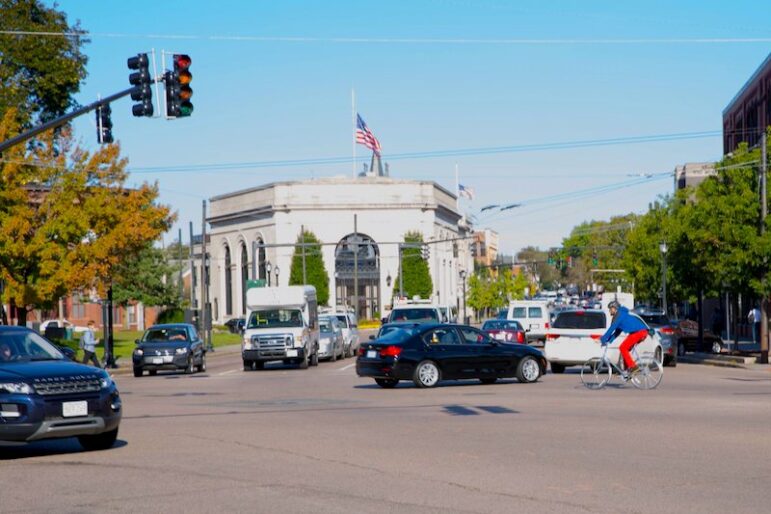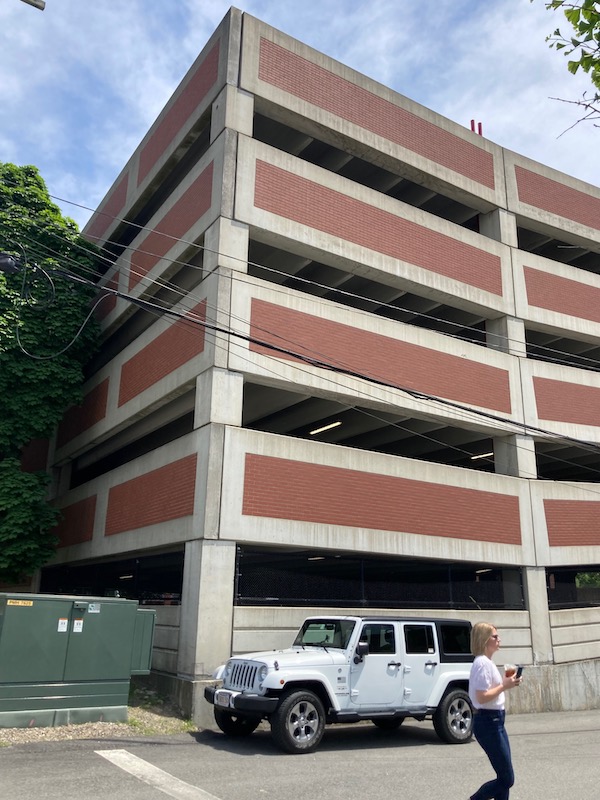
By Mark Pickering
Watertown stands at a crossroads – on two separate issues. What we do now will guide the city’s way into the future. One question is whether to continue to be a city that emphasizes the use of cars and ignores public transit.
The other question is whether to allow the construction of taller buildings in the Square. To this I answer in a hearty: Yes!
Regarding the other question, it’s good to recall: MBTA service to Watertown is the worst of any Boston neighborhood or abutting community. That is, Watertown has no subway, trolley, or commuter rail stop as well as no transit center. We deserve better.
The question of how to redesign Watertown Square has not been thoroughly worked out and makes the public transit system worse, not better. In addition, there’s no vision for the future There’s nothing there to get residents out of their cars to fight climate change and unclog the roads.
Until those plans are developed, the space dedicated now to public transit in the so- called Watertown Yard should stay dedicated to public transit. The same goes for the area that used to be part of the Square’s former rotary – where MBTA buses such as the No. 71 now stop. (As an aside, the rotary was wild even for the beat-up company trucks I drove back in the late 1970s.)
Looking around the world, a key part of revitalizing an urban shopping district has been improving public transit so it encourages ridership. The current plan offers nothing. The current Watertown Square plan sends the No. 71 bus in the wrong direction (south) over a too-narrow bridge to the run-down MBTA yard.
To promote ridership, one thing that’s needed is a new transportation center.
Sometimes I tell my 8-year-old: “You never know what you might see, if you actually look around.” I decided to follow my own advice.
The property right behind where the Route 71 stops might have the makings of a new transit center. The building itself is underused. And despite the Steward sign on the Riverbend Office Park building, the hospital company is no longer there.
In addition, there is a 5-level garage behind the Riverbend building. There seemed to only be 6 cars parked in the whole thing. Talk about underused.

Of course the Watertown Yard is another possibility for a transportation center.
In Greater Boston, there are two bus routes that should have been serviced by an MBTA subway years ago. That would be Blue Hill Avenue in Dorchester/Mattapan and the No. 70 route that serves Watertown and three other cities.
In Boston, the city has a $44 million plan to rebuild a whole stretch of Blue Hill Ave. and run buses down the middle of the street. In Watertown, there’s no plan at all.
With that in mind, I recommend that we table the redesign proposal for Watertown Square, until there is a short-term plan and a long-term vision. If not, the redesign plan should be amended to make explicit Watertown’s commitment to improving public transit.
Mark Pickering is a veteran of the local news business, having worked on the business desk and the opinion pages of the Boston Herald.
Thank you. I wholeheartedly agree that Watertown needs to commit to improving public transit.
As for taller buildings, my hope would be for more appealing architecture overall. Please no more brutalist behemoths!
I agree with Mr. Pickering’s critique that transportation gets short shrift in The Watertown Square Area Plan. As one who is car free and who relies on public transportation, I hoped to see fresh ideas for making Watertown a transportation hub.
Clearly, climate change and the contribution of tailpipe emissions to the looming crisis require getting more people out of their cars. That will not happen unless we can boost public transportation ridership. If public transportation is not a reliable alternative to sitting in traffic, people will opt for being part of the problem. That is why the MBTA issues advisories of 20-minute traffic delays for buses leaving Watertown Yard — even for the No. 57’s first run to Kenmore at 5 AM. Yes, delay due to traffic at 5 AM.
Excellent points we seem to have overlooked. Must attend the meetings and voice our concerns.
I agree that a public transit rethink should be part of any redesign of Watertown Sq.
Currently, the transit in Watertown is a joke.
It’s ridiculous to say that we can just shelve the whole plan and waste all the time and money spent so far. More to the point, your commentary ignores one stunningly important piece of context: The city of Watertown does not control the MBTA. Getting “people out of their cars” is a broader regional issue because people don’t just drive from one place in Watertown to another place in Watertown. A regional transit plan which spans multiple cities/towns requires agreement among all those municipalities. This is outside the scope of what we’re trying to do improving our city center.
Sending the 71 bus across the river is not the “wrong direction,” it’s a compromise solution to a difficult set of existing physical constraints.
Re: the Steward building and empty parking garage behind it, did you investigate exactly who owns that property before you suggest it be converted into a “transportation center”? If Steward is leasing the building, the property owner would have to agree with your plans. If Steward owns it, this asset will be liquidated (sold to another owner) as part of the bankruptcy.
Sometimes you have to dream big first and figure out the details later. Otherwise, everything becomes a compromise. There are a lot of good ideas here that should be fostered, not stifled.
Crisis often results from too much compromise. It is time for a correction. Thanks for this insight.
Thanks for this letter!
Reminder to sign comments with your full name.
I summarily disagree with the part on transit and proposal to scrap the plan. Transit is a part of the overall solution, and not a killswitch. It would be ideal for plans to occur concurrently but ideal is no longer an option in a time of deep, profound crisis that has been in the making for over 30 years – the roosters have come roost. Plus, agile leaders understand that plans can occur asynchronously, and sometimes that produces a better result.
Residents paying up to 50% of income on housing/rent need not only better than this proposal but needed resolution yesterday. Residents are underhoused and some are even over-housed. It’s no accident that the square has areas of blight. Mobility and dynamism has come to a halt, and housing plays an integral part. It undergirds all aspects of life. It would be extremely irresponsible to throw a non-showstopper, at this point, in the process. There would zero forgiveness for such an irresponsible act.
Reminder to sign comments with your full name.
While this very long process has been occuring, a house in Brockton, a high crime municipality in which the schools operate online now, just sold for $850,000. This town is often mentioned as a solution when individuals bring up the high and unsustainable costs of housing. It appears one can’t move to Brockton either.
https://www.msn.com/en-us/money/realestate/home-on-n-cary-street-in-brockton-sells-for-850k-easton-home-for-almost-1m/ar-BB1o02eV?ocid=entnewsntp&pc=U531&cvid=847a1b1f53bb421c95c225d5731c9259&ei=72
Per the FBI, Top 5 Most Dangerous Cities In Massachusetts (2024
Holyoke
North Adams
Springfield
Chelsea
Brockton
Massachusetts home prices are increasing much fast than the national average, there’s no debating that. But what a bizarre anecdotal example to make. Especially since when you look at recent sales in Brockton. 27 of the last 30 single family homes sold for under 600k. 27 of the last 30 condo/townhomes went for under 400k, with 18 of them being under 300k. So I ask, what exactly is the point of referencing one home that went for over 800 back in March?
This is not apropos of nothing as Brockton is always brought up when it comes to solving the housing crisis. Most conversation go something like this. A solution is provided and then someone always offers, “Why don’t you move west or south like Brockton? The point is that those who don’t want to address the elephant in the room cannot continually tell others to move elsewhere. While one house sold for 850,000 it doesn’t not mean it will be the last, on the contrary. And with 30 homes going for 600k, it won’t be too soon before that is that is the median price. The point is that we cannot run from the problem anymore because there is nowhere to run. So either people seriously start addressing the crisis yesterday or continue to make it worse.
That house is 2600 sq/ft on .7 acre with 4bd 4bath 2 car garage pool & jacuzzi. If it was in Watertown it would be easily 1.8m-2m for the home.
Randomly looking at a homes price without considering its features makes no sense when trying to compare prices across towns/cities. That is a lot of house for $850k and the underperforming schools, high crime, and distance to Boston are the main factors keeping under 7 figures.
But why are we at these ranges? Why does an equivalent house in Watertown now cost close to two million? It wasn’t too long ago that such a house in Watertown was $850,000, and such a house in Brockton didnt exist. No developer would risk such a project. Now because of the mass exodus from the intercore cities, such a risk is manageable. The housing crisis has not been addressed, it has now been shifted elsewhere. And this is another signal.